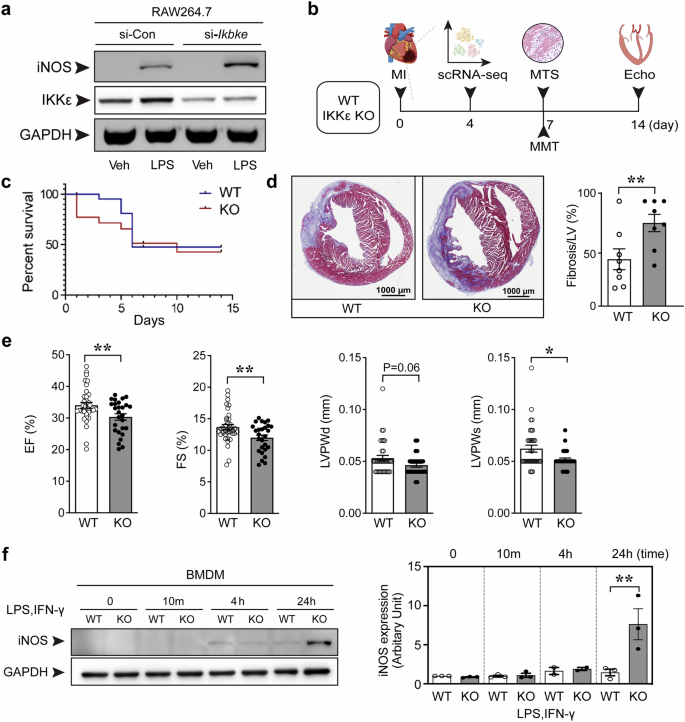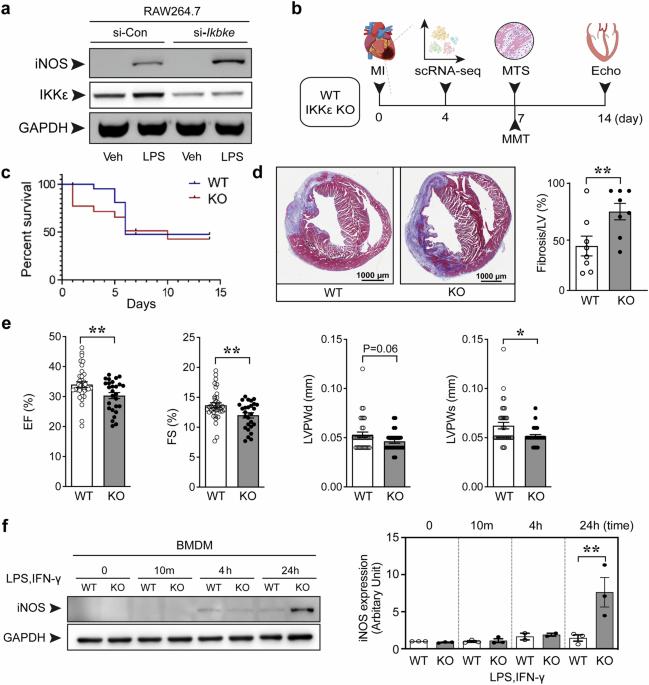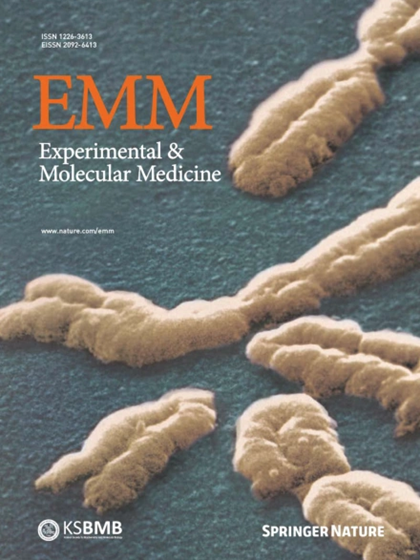IKKε-deficient macrophages impede cardiac repair after myocardial infarction by enhancing the macrophage–myofibroblast transition
IF 9.5
2区 医学
Q1 BIOCHEMISTRY & MOLECULAR BIOLOGY
引用次数: 0
Abstract
The regulatory role of the inhibitor of NF-kB kinase ε (IKKε) in postmyocardial infarction (MI) inflammation remains uncertain. Using an MI mouse model, we examined the cardiac outcomes of IKKε knockout (KO) mice and wild-type mice. We employed single-cell RNA sequencing (scRNA-seq) and phosphorylated protein array techniques to profile cardiac macrophages. IKKε KO mice exhibited compromised survival, heightened inflammation, pronounced cardiac fibrosis, and a reduced ejection fraction. A distinct cardiac macrophage subset in IKKε KO mice exhibited increased fibrotic marker expression and decreased phosphorylated p38 (p-p38) levels, indicating an enhanced macrophage–myofibroblast transition (MMT) post-MI. While cardiac inflammation is crucial for initiating compensatory pathways, the timely resolution of inflammation was impaired in the IKKε KO group, while the MMT in macrophages accelerated post-MI, leading to cardiac failure. Additionally, our study highlighted the potential of 5-azacytidine (5-Aza), known for its anti-inflammatory and cardioprotective effects, in restoring p-p38 levels in stimulated macrophages. The administration of 5-Aza significantly reduced the MMT in cardiac macrophages from the IKKε KO group. These findings underscore the regulation of the inflammatory response and macrophage transition by the IKKε-p38 axis, indicating that the MMT is a promising therapeutic target for ischemic heart disease. Heart attacks can result in heart failure due to ongoing inflammation and scarring. This research investigates how a specific protein, IKKε, affects inflammation in heart cells. Researchers used genetically altered mice and sophisticated genetic methods to study IKKε‘s role in heart disease. They analyzed heart tissue after inducing heart attacks in the mice, focusing on how cells involved in inflammation and scarring behave differently when the IKKε protein is changed. Macrophage-myofibroblast transition (MMT) is a process in which macrophages acquire characteristics similar to myofibroblasts, potentially contributing to tissue fibrosis. The main discovery is that blocking IKKε causes more scarring by encouraging excessive MMT, suggesting it could be a target for heart disease treatment. The researchers believe that controlling the MMT process could be a new method to enhance heart health after a heart attack by reducing harmful scarring. This summary was initially drafted using artificial intelligence, then revised and fact-checked by the author.


IKKε缺陷的巨噬细胞通过增强巨噬细胞-肌成纤维细胞转化阻碍心肌梗死后的心脏修复
NF-kB激酶ε抑制剂(IKKε)在心肌梗死(MI)后炎症中的调节作用仍不确定。我们利用心肌梗死小鼠模型,研究了IKKε基因敲除(KO)小鼠和野生型小鼠的心脏预后。我们采用了单细胞 RNA 测序(scRNA-seq)和磷酸化蛋白阵列技术来分析心脏巨噬细胞。IKKε KO小鼠表现出存活率下降、炎症加剧、明显的心脏纤维化和射血分数降低。IKKε KO 小鼠中一个独特的心脏巨噬细胞亚群表现出纤维化标志物表达增加和磷酸化 p38(p-p38)水平降低,表明心肌梗死后巨噬细胞-肌成纤维细胞转化(MMT)增强。虽然心脏炎症是启动代偿途径的关键,但在 IKKε KO 组中,炎症的及时解决受到了影响,而巨噬细胞的 MMT 在心肌梗死后加速,从而导致心力衰竭。此外,我们的研究还强调了 5-氮杂胞苷(5-Aza)在恢复受刺激巨噬细胞中 p-p38 水平方面的潜力,5-氮杂胞苷具有抗炎和保护心脏的作用。给予 5-Aza 能明显降低 IKKε KO 组心脏巨噬细胞中的 MMT。这些发现强调了IKKε-p38轴对炎症反应和巨噬细胞转化的调控作用,表明MMT是治疗缺血性心脏病的一个很有前景的靶点。
本文章由计算机程序翻译,如有差异,请以英文原文为准。
求助全文
约1分钟内获得全文
求助全文
来源期刊

Experimental and Molecular Medicine
医学-生化与分子生物学
CiteScore
19.50
自引率
0.80%
发文量
166
审稿时长
3 months
期刊介绍:
Experimental & Molecular Medicine (EMM) stands as Korea's pioneering biochemistry journal, established in 1964 and rejuvenated in 1996 as an Open Access, fully peer-reviewed international journal. Dedicated to advancing translational research and showcasing recent breakthroughs in the biomedical realm, EMM invites submissions encompassing genetic, molecular, and cellular studies of human physiology and diseases. Emphasizing the correlation between experimental and translational research and enhanced clinical benefits, the journal actively encourages contributions employing specific molecular tools. Welcoming studies that bridge basic discoveries with clinical relevance, alongside articles demonstrating clear in vivo significance and novelty, Experimental & Molecular Medicine proudly serves as an open-access, online-only repository of cutting-edge medical research.
 求助内容:
求助内容: 应助结果提醒方式:
应助结果提醒方式:


